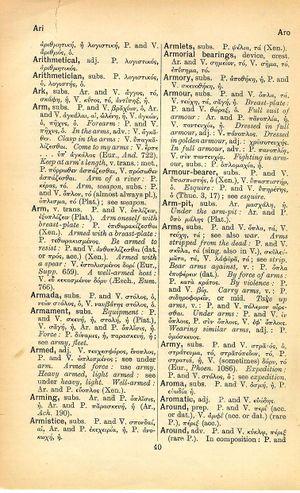aroma
διὸ δὴ πᾶς ἀνὴρ σπουδαῖος τῶν ὄντων σπουδαίων πέρι πολλοῦ δεῖ μὴ γράψας ποτὲ ἐν ἀνθρώποις εἰς φθόνον καὶ ἀπορίαν καταβαλεῖ → And this is the reason why every serious man in dealing with really serious subjects carefully avoids writing, lest thereby he may possibly cast them as a prey to the envy and stupidity of the public | Therefore every man of worth, when dealing with matters of worth, will be far from exposing them to ill feeling and misunderstanding among men by committing them to writing
English > Greek (Woodhouse)
subs.
Latin > English (Lewis & Short)
ărōma: ătis, n. (dat. and
I abl. plur. aromatibus, also aromatis, App. Flor. 4, 19; v. Neue, Formenl. I. p. 291), = ἄρωμα>, a spice; in sing., Dig. 39, 4, 16, § 7; Prud. στεφ. 8, 72; id. Apoth. 826; in plur., spices (so only in Vulg.), Col. 12, 20, 2; Vulg. Gen. 37, 25; ib. Exod. 25, 6; ib. Marc. 16, 1; ib. Joan. 19, 40 et saepe.

